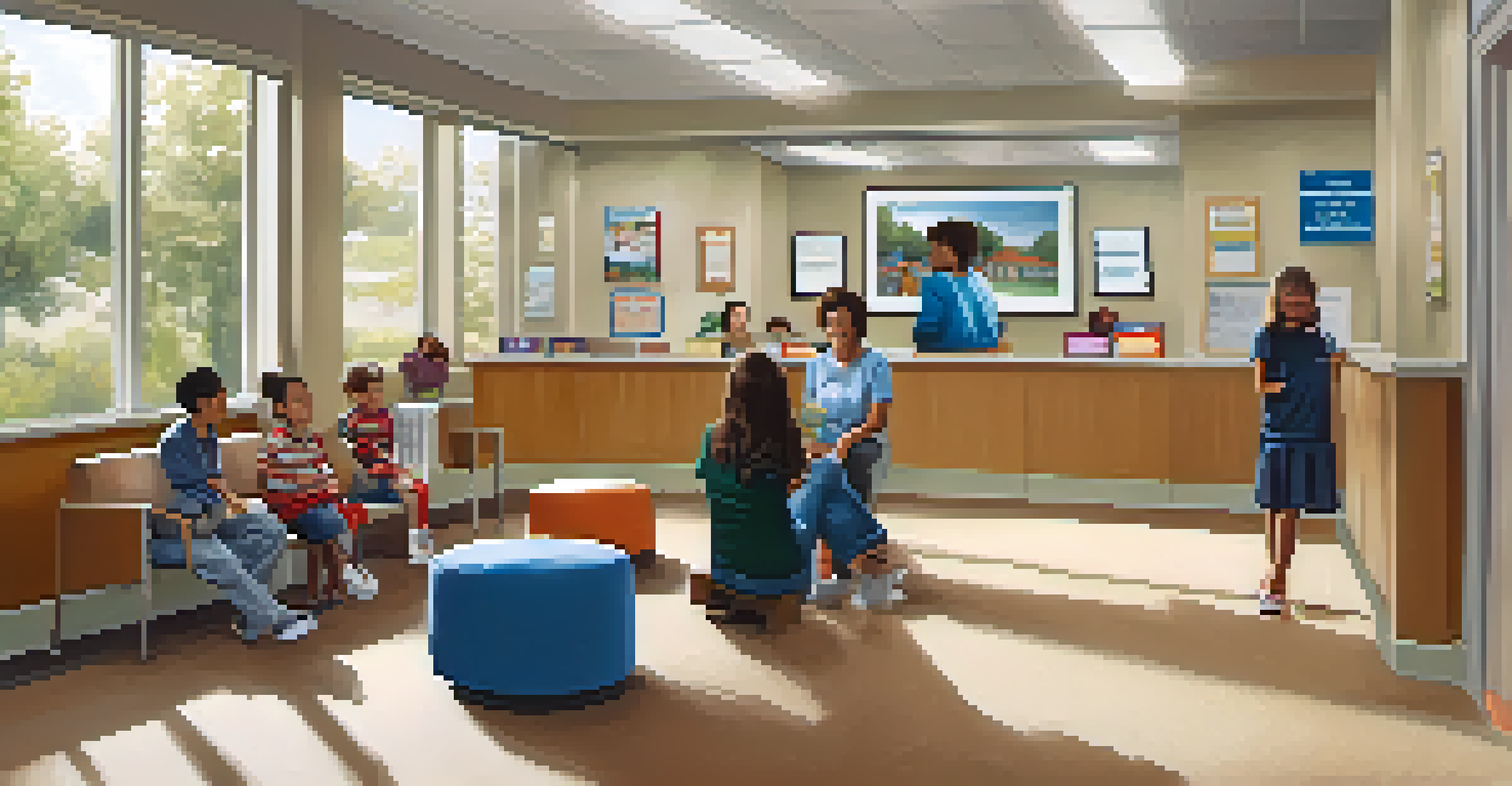The Role of Community Health Centers in Public Health Initiatives

Understanding Community Health Centers and Their Purpose
Community Health Centers (CHCs) are local healthcare facilities that provide comprehensive services to underserved populations. They focus on delivering primary care, preventive services, and education to improve overall community health. By offering these services, CHCs play a vital role in ensuring that everyone, regardless of their income or insurance status, has access to necessary healthcare.
Health is a community affair, and community health centers play a vital role in making health accessible to all.
These centers often serve as a one-stop shop for health services, addressing both physical and mental health needs. For example, a community health center might provide immunizations, dental care, and even mental health counseling under one roof. This integrated approach not only simplifies access but also fosters a sense of community among patients.
Moreover, CHCs are crucial in reducing health disparities that exist in many communities. They work tirelessly to reach vulnerable groups, ensuring that marginalized populations receive the care they need. This commitment to equity is at the heart of their mission, making them indispensable to public health efforts.
The Role of CHCs in Preventive Care and Education
Preventive care is one of the cornerstones of public health, and community health centers excel in this area. By focusing on preventive services such as screenings, vaccinations, and health education, CHCs help catch potential health issues before they become serious. For instance, regular screenings for diabetes or hypertension can lead to early intervention and better health outcomes.

Education is equally important in the preventive care realm. CHCs often conduct workshops and outreach programs to inform the community about healthy lifestyles, nutrition, and disease prevention. This proactive approach empowers individuals to take charge of their health, creating a ripple effect of positive health behaviors within the community.
CHCs Provide Essential Healthcare Access
Community Health Centers ensure that underserved populations receive comprehensive healthcare services, regardless of income or insurance status.
Additionally, these centers often collaborate with local organizations to extend their reach. By partnering with schools, churches, and community groups, CHCs can effectively disseminate valuable health information and resources. This collaborative spirit enhances the overall health literacy of the community.
Addressing Behavioral Health through CHCs
Behavioral health is a critical component of overall wellness, and community health centers are increasingly addressing this need. Many CHCs now offer mental health services, including counseling and substance abuse treatment, to support the emotional and psychological well-being of their patients. This holistic approach recognizes that mental health is just as important as physical health.
The greatest wealth is health, and community health centers are essential in ensuring that everyone can achieve it.
By integrating behavioral health services with primary care, CHCs create a supportive environment for patients. For example, a patient visiting for a routine check-up can also receive mental health support, which can lead to better health outcomes. This integration helps reduce stigma and encourages more people to seek help when they need it.
Furthermore, CHCs often implement community outreach programs to raise awareness about mental health issues. These initiatives can educate the public on recognizing the signs of mental health struggles and provide resources for those in need. By fostering open conversations about mental health, CHCs contribute to a more informed and supportive community.
Community Engagement: A Core Function of CHCs
Community engagement is fundamental to the mission of community health centers. These centers are designed to reflect the needs and priorities of the communities they serve, which requires active participation from local residents. By involving community members in decision-making processes, CHCs ensure that the services they offer are relevant and effective.
For instance, many CHCs have advisory boards made up of community members who provide insights and feedback on healthcare services. This collaboration helps identify gaps in care and informs future initiatives, making the centers more responsive to the community's needs. It also fosters a sense of ownership and pride among residents.
Preventive Care is a CHC Cornerstone
By focusing on preventive care and health education, CHCs empower communities to manage their health proactively and improve overall health outcomes.
In addition to advisory boards, CHCs often host community events to promote health and wellness. These events may include health fairs, workshops, and educational seminars that encourage community participation. By engaging with the community in this way, CHCs not only build trust but also strengthen the overall health of the population.
The Impact of CHCs on Health Disparities
One of the most significant roles of community health centers is their ability to address health disparities. Many underserved populations face barriers such as lack of access to care, financial constraints, and cultural differences that can prevent them from seeking necessary healthcare. CHCs aim to bridge these gaps by providing affordable and culturally competent care.
For example, CHCs often employ bilingual staff and offer services tailored to the unique needs of diverse populations. This approach not only makes healthcare more accessible but also helps build trust between patients and providers. When individuals feel understood and respected, they are more likely to seek care and adhere to treatment plans.
Moreover, CHCs collect and analyze data on health outcomes within their communities, allowing them to track progress and identify areas for improvement. By focusing on these disparities, CHCs can advocate for policy changes and additional resources to address systemic issues in healthcare access. Their efforts play a crucial role in creating a more equitable healthcare landscape.
The Role of Technology in CHCs and Public Health
In today's digital age, technology plays a pivotal role in enhancing the services provided by community health centers. Telehealth, for instance, has revolutionized the way patients access care, especially in rural or underserved areas. Through virtual visits, individuals can consult with healthcare providers from the comfort of their homes, breaking down geographical barriers to care.
Additionally, CHCs are increasingly adopting electronic health records (EHR) to streamline patient information and improve care coordination. EHRs facilitate better communication between providers and ensure that patients receive comprehensive and consistent care. This technological integration enhances efficiency and ultimately leads to better health outcomes.
Technology Enhances CHC Services
The integration of technology, such as telehealth and electronic health records, allows CHCs to improve service delivery and address community health needs effectively.
Furthermore, technology allows CHCs to gather valuable data on patient health trends and community needs. By analyzing this data, centers can tailor their services and programs to address the specific issues facing their communities. This data-driven approach empowers CHCs to make informed decisions and continuously improve public health initiatives.
Funding and Support for Community Health Centers
Funding is a critical aspect of the sustainability and effectiveness of community health centers. These centers often rely on a mix of federal, state, and local funding, as well as private donations, to operate. The Health Resources and Services Administration (HRSA) plays a key role in providing federal support to CHCs, helping them expand services and reach more patients.
However, securing consistent funding can be challenging, particularly in times of economic uncertainty. Many CHCs face budget constraints that limit their ability to offer comprehensive services. Advocacy for increased funding is essential to ensure that these centers can continue to fulfill their mission of providing care to underserved communities.

Community support also plays a vital role in sustaining CHCs. Engaging local communities in fundraising efforts and awareness campaigns can help generate additional resources. By highlighting the importance of CHCs, community members can rally support and ensure that these essential services remain available for those in need.